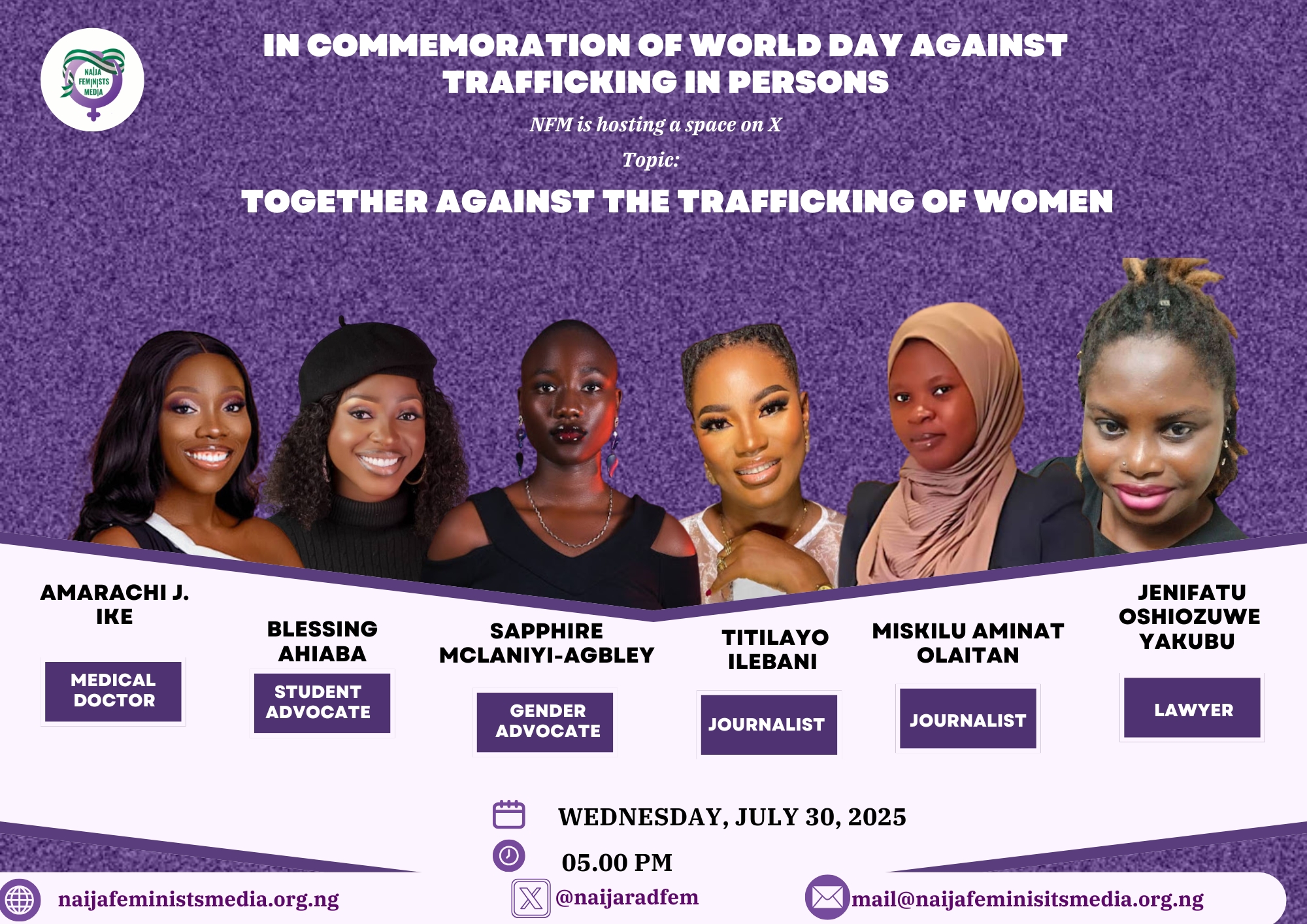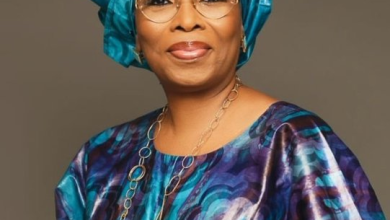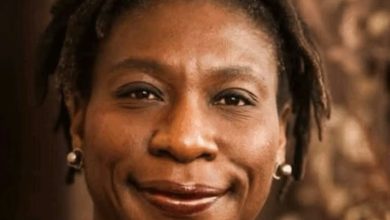
|
Getting your Trinity Audio player ready...
|
To mark the 2025 World Day Against Trafficking in Persons, Naija Feminists Media held a virtual X Space conversation titled “Together Against the Trafficking of Women,” which drew in over 130 listeners. The event took place at 5 PM on 30 July 2025.
Moderated by NFM’s Partnerships Officer, Nkechi Igwebuike, the conversation brought together professionals and advocates from legal, medical, media, and activist backgrounds to examine the gendered nature of trafficking and advocate for collective action.
Nkechi described trafficking as a structural and systemic crisis that deeply affects women and girls. She emphasised that addressing it requires teamwork across sectors, especially among those who work with vulnerable groups.
As such, gender advocate and writer Sapphire Mclaniyi-Agbley highlighted the importance of the conversations. She pointed out that while human trafficking is a serious issue, it is often overlooked in broader conversations about the challenges faced by women.
“When we look at human trafficking, it’s not a separate problem from everything else that we experience,” she noted, stressing the importance of viewing it within the wider context of violence against women.
As a gender advocate, she explained how deeply rooted patriarchal systems increase women’s vulnerability to trafficking by reducing them to their reproductive or functional value. She also cited contributing factors such as lack of education, economic disparity, and limited intellectual independence. Speaking as a writer, she underlined the need for women to tell their own stories for deeper analysis and to shape public understanding.
Journalist Miskilu Aminat Olaitan criticised the way Nigerian media outlets sensationalise stories of trafficking. She noted that there is an overemphasis on sex trafficking, while other serious forms, such as domestic and labour trafficking, are neglected.
“Apart from lawyers and actual experts with specialised knowledge in media, media practitioners and journalists also play a vital role in creating awareness and shaping public perception,” she noted.
Drawing from her reporting experience, she explained that many journalists lack the training to report complex issues like trafficking with sensitivity. Aminat observed that survivor images are often used carelessly, which can retraumatise victims. She called for ethical reporting and more capacity building for media professionals.
Student advocate Blessing Ahiaba spoke on the deep emotional and psychological toll that trafficking takes on victims. She reminded listeners that trafficking does not only happen across borders but also within communities and cities. Many girls, she said, are lured by false promises of better opportunities, only to face abuse and abandonment. She warned that survivors often struggle with depression, isolation, and suicidal thoughts due to shame and social stigma, urging greater empathy from the public.
Lawyer and feminist Jenifatu Oshiozuwe Yakubu gave an overview of Nigeria’s existing legal frameworks, including the Trafficking in Persons (Prohibition) Enforcement and Administration Act (2015) and the Child Rights Act (2003). She explained that while the laws exist, enforcement remains weak and inconsistent across states.
She stressed the need for survivor-centred justice and trauma-informed approaches within the legal process. Jennifer pointed out that in trafficking cases, consent is legally irrelevant just as it would be in cases involving minors or abuse. She advocated for increased legal awareness in communities and encouraged feminist movements to engage more actively with the justice system to push for reforms.
Dr Amarachi J. Ike, a medical doctor, discussed the health consequences of trafficking, particularly for women and children. She explained that victims can suffer from sexually transmitted infections, skin conditions like scabies, reproductive health issues, and long-term mental health conditions such as PTSD and depression.
For trafficked children, she highlighted signs like malnutrition, dehydration, and stunted growth. She urged health professionals to recognise these signs early and assess the possibility of trafficking. Dr Amarachi also called for trauma-informed medical care and better collaboration between hospitals, social workers, and support services. She noted that the lack of a robust social services system in many Nigerian health facilities makes it harder to identify and support victims.
NFM’s founding director, Simbiat Bakare, contributed that trafficking is not something a person can truly consent to. According to her, dismantling the systems that allow exploitation of women and girls requires collective action from both lawmakers and citizens.
Further, Sapphire emphasised that storytelling and writing can be used to humanise survivors and debunk harmful myths about trafficking in African communities. She urged the public to show empathy and to look beyond sensational headlines. Blessing addressed common misconceptions, such as the belief that trafficking only occurs abroad or only involves sex work and encouraged young girls to know they are not alone, stressing the importance of support, dignity, and rejecting stigma.
The conversation closed with Jenifatu’s call for urgent reforms to Nigeria’s justice system. She insists that survivor voices must inform policy and notes that achieving justice goes beyond legal action; it must also involve restoring dignity and repairing harm.
All speakers agreed that trafficking is a form of gender-based violence rooted in patriarchy, poverty, and inequality. Ending it, they emphasised, will require sustained collaboration, survivor advocacy, and feminist-led efforts.






